Anticipation builds over if Obama will visit Hiroshima
Question remains whether US president’s Japan trip will see him visit city where US dropped atomic bomb during World War II
 ( Samuel Corum - Anadolu Agency )
( Samuel Corum - Anadolu Agency )
By Todd Crowell
TOKYO
A powerful head of steam has been building for President Barack Obama to become the first United States leader to visit Hiroshima when he travels to Japan in late May.
Obama is set to visit Japan for the May 26-27 Group of Seven summit, after Secretary of State John Kerry became the highest-ranking American to visit the city where 140,000 people were killed after the U.S. dropped an atomic bomb during World War II.
The Nikkei Asian Weekly magazine recently cited “high-ranking officials” flatly predicting that the decision for Obama’s visit had been made.
The report was not officially confirmed, but not strongly denied either.
Nevertheless, it is increasingly clear that the president wants to make what would be a historic visit, and as he is in the last months of his term of office, it had better be now or never.
Obama began his administration in 2009 with a notable speech in Prague about seeking a world without nuclear weapons.
He could cap this off with a similar speech in Hiroshima in the waning months of his term.
“I think the president would like to do it,” John Roos, who served as Obama’s first ambassador to Japan, told the Washington Post earlier this month.
Roos made a similar gesture when in 2010 he became the first U.S. official to attend the memorial for the anniversary of the Aug. 6, 1945 bombing.
The atomic bombing killed an estimated 140,000 people -- some immediately and others later from radiation sickness -- in Hiroshima by the end of the year.
Another estimated 74,000 people were left dead after the bombing of Nagasaki three days later.
Earlier this month, Secretary of State Kerry paid homage to the victims of the atomic bombing when he joined six other foreign ministers in laying wreaths at the Cenotaph in Hiroshima.
The Kerry visit was widely seen as a kind of dress rehearsal for a presidential visit -- one that seems to have been a success.
There was hardly any criticism of, or even much attention given to, the visit in the U.S., a country consumed by a hot political campaign season.
It would appear that elite opinion in the U.S. is lining up behind the idea of a presidential visit, with both the New York Times and the Washington Post -- two highly influential papers -- writing editorials in favor.
At the same time, the Japanese side is making gestures seemingly easing the matter for the U.S. president by publically disclaiming any demand that he apologize for the bombing.
“We’re not asking for an apology,” said Foreign Minister Fumio Kishida, who represents Hiroshima in parliament.
Of course, no details have been released of exactly what Obama would do in Hiroshima.
Will he make a speech or not; will he meet with some of the aging survivors; will he tour the Hiroshima Memorial with its “gut wrenching” -- Kerry’s words -- pictures of victims?
Will he take questions from the press -- including some that might put him in a hard place between the conflicting view of the Japanese, who view Hiroshima as an atrocity, and Americans, who see it as being necessary for the war’s end.
The Japanese press may be poised to pounce with questions along the lines of “do you agree with President Truman’s decision to use the atomic bomb?”
Such inevitable questions will tax his speechwriters’ abilities to produce creative obfuscation to the limit.
Even if he should do nothing but stand silently, letting himself be photographed looking at the Atom Dome, the iconic emblem of the bombing, Obama might be accused of making a “silent apology”.
Then again, the reaction might be fairly muted as the American public focuses on the election campaign to pick the person to succeed him.
Japan has never apologized for its Dec. 7, 1941 surprise attack on Pearl Harbor in Hawaii, nor has a leader visited the USS Arizona Memorial site commemorating the more than 1,100 American sailors and marines killed in the incident.
Japanese Emperor Akihito, however, has paid his nation’s respects by laying a wreath at the Punch Bowl National Cemetery in Hawaii, and his father, the wartime Emperor Hirohito, did the same at Arlington National Cemetery during a visit to the U.S. in the 1970s.
Many Japanese are sympathetic to the idea that the bombings brought the war to a quick close.
They simply wish the Americans were more sensitive to the lives -- mostly civilian -- lost rather than dwelling on the servicemen lives that were saved.
If Obama could keep things on that level -- a universal respect for the dead -- then a trip to Hiroshima might be a success.
Anadolu Agency website contains only a portion of the news stories offered to subscribers in the AA News Broadcasting System (HAS), and in summarized form. Please contact us for subscription options.







